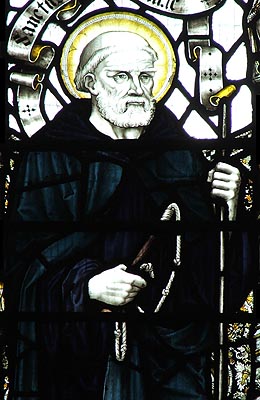
EBK Home
Kingdoms
Royalty
Saints
Pedigrees
Archaeology
King Arthur
Mail David
 St. Guthlac
St. Guthlac(c.AD 673-714)
St. Guthlac was the son of Penwald, a minor prince from the Royal Mercian House of Icling, and his wife, Tette. Born around AD 673, he was a serious child, not given to boyish pranks. Yet upon reaching manhood at fifteen, he decided to become a soldier of fortune. He collected a great troop of armed followers around him and, together, they ravaged the countryside, burning, raping and pillaging as they went. For nine years, Guthlac carried on with this thoughtless way of life until, one night, he had a heavenly dream that instilled him with love and compassion for his fellow man. He made an oath to dedicate his life to the service of the Lord and, in the morning, bade his companions farewell. He forsook his accumulated wealth and went off to join the dual-monastery at Repton in Derbyshire, where he received the tonsure from Abbess Aelfthrith.
After two years in the monastery, Guthlac began to long for the more secluded life of a hermit. So, having acquired leave from the monastic elders, he departed for the great Fens, north of Cambridge. Unlike the well drained arable land of today, the Fens were then a labyrinth of black wandering streams, broad lagoons and quagmires with vast beds of reeds, sedge and fern. The islands amongst this dismal swamp were a great attraction for the recluse.
Guthlac was directed to a particular one of these islands by a local man named Tatwin. Many people had attempted to inhabit it before, but none had succeeded, on account of the loneliness of the wilderness and its manifold horrors. The twenty-six year old Guthlac eagerly rose to such a challenge and arrived in a little boat at his new home of the "Crow Land" on St. Bartholomew's Day. He surveyed the area a while before returning to Repton for supplies and building materials with which he returned with the help of two servants. St. Guthlac found an ancient tumulus on the island, against which he built himself a hermitage. He resolved to wear only skins and ate only barley bread and drank water each day. For a while, he was disturbed on his little island by a number of the native British inhabitants who dragged him into the swamp and beat him. In the dark night, Guthlac imagined he was attacked by horrible monsters. There were other dangers closer to home however. Guthlac's servant, Beccel, was shaving him one day, when he was seized by a desire to cut his master's throat and install himself in his cell, that he might instead be honoured by the locals as a holyman. Luckily, the perceptive Guthlac saw the temptation within and shamed the offender into confession and repentance.
Guthlac was a tall trim man. He was mild, engaging, tolerate, modest, patient and humble. These many virtues were recognised by the Fenland wildlife. All the wild birds came to him and fed from his hands. Ravens, though at first tormenting him by stealing letters and gloves from his visitors, later, seized with compunction at his reproofs, brought them back. As Wilfrid, a holy visitant, was once conversing with him on his island, two passing swallows flew down onto the saint's shoulders and burst into song. Guthlac believed that, "With him who has led his life after God's will, the wild beasts and wild birds are tame."
After fifteen years in the Fens, Guthlac was seized by an alarming illness while at prayers in his chapel. Beccel ran to his side and tended him; but the holy man was dying. He hung on for another eight days, giving his servant detailed instruction for his burial by his sister, Pegge, in a lead coffin and a sheet given him by Abbess Edburga. He died on 11th April AD 714 and the great Abbey of Croyland grew up around his grave.
